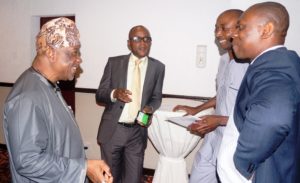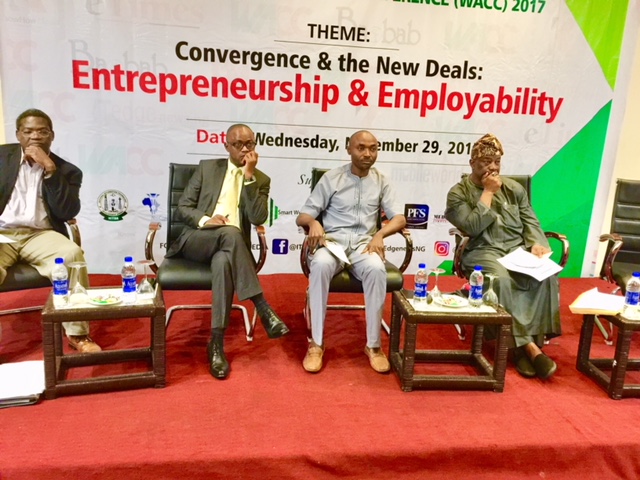By Oluwatobi Opusunju
More than 35% of Africa’s urban populations are frequent users of social media, a report by IT Edge News has indicated. In some highly ‘social media’ cities, the engagement is higher than 50% surprisingly in a continent that is still heavily under-infrastructure. But internet penetration with social media is growing rapidly and has helped to spur political and economic rallies on the streets.

Post-session talks at WACC 2017. L-R: Chairman of ICT Committee at the Federal House of Representatives, Hon. Mohammed Ogoshi Onawo; Founder/CEO of Qed.ng, Olumide Iyanda; Dr. Sesan Abraham, conflict manager and lecturer at the University of Jos, and Olusegun Oruame, CEO at Knowhow Media International
Remember the Twitter-spurred uprisings in Tunis and then the Arab Spring? Cameroon had to shut down the internet, most of this year, to freeze the secessionist campaigns and street protests in the southern part of the country. In Kenya as is elsewhere on the continent, particularly sub-Saharan Africa, social media has become a strong tool for citizens’ mobilization in way that has kept governments and policy makers aiming to rework citizens’ engagements. This was a sessional theme at the 9th West Africa Convergence Conference (WACC 2017) in Lagos where stakeholders advised government to consider technology a robust assistant for citizens’ mobilization for good governance and development.
Prof. Samuel Zalanga of Bethel University, Minnesota USA who was speaking on the topic “Convergence, Governance and Citizens Engagement” noted that the internet has changed the way democracy is seen in developed countries like the United Sates.
He said: “the internet and the social media in particular is capable of making one re-evaluate democracy as well as provide the citizens with diverse information…. The internet if properly used has a huge positive impact on democracy. You can be in Nigeria, but when you see how democracy is working in other countries you will be wowed.”
Zalanga argued that it was in government’s interest to engage citizens and inform them on programmes affecting them so as to take them along. Social media is not good governance but it is an excellent platform to engage citizens, create awareness on development programmes, win support and confidence of the populace and encourage participation of citizens in creating an acceptable social order.
“Government shouldn’t wait for fake news to spread like wild fire before passing on the true story to the citizens and even when there’s a fake story, the government should ensure it counters it so as to avoid conflict” – Dr Abraham
Founder/CEO of Qed.ng, Olumide Iyanda , a panelist conceded that the internet can help the government to better interact with citizens once government knows how to navigate the social media. To Iyanda, with over 6000 tweets on Twitter every second and 1.71 billion monthly active users on Facebook, the Nigerian government cannot be left behind in taking social media as an effective means of communicating with the citizens.
Citing the Economic and Financial Crimes Commission (EFCC) as a government agency that has used social media for good. Iyanda said the EFCC has effectively engage citizens through the use of social media and thus, significantly change the public perception about what they think about the agency and its work. “Instead of EFCC seeing social media as a tool that wasn’t working for them they saw it as a tool they could take advantage of,” said Iyanda.
Government’s use of social media will further make the citizens aware that they have a role to play in the affairs of the country which is the hallmark of democracy. According to the Chairman of ICT Committee at the Federal House of Representatives, Hon. Mohammed Ogoshi Onawo who moderated the session, “government has a role to play to encourage the engagement of citizens through social media. The convergence of technology only means that the internet now offers diverse opportunities for government to reach out to citizens in realtime whether via audio, video or plain text messages.
According to Onawo, President Donald Trump of the US has proven the point that he can reach the citizens directly through social media; he can share information, seek feedbacks and mobilise public opinion in his favour. However, Dr. Sesan Abraham, a lecturer at the University of Jos, warned against unfettered use or reliance on social media. As it is today, unverified information on social media has caused havoc and led to disruption of normalcy in several jurisdictions. Abraham argues that that the law regulating social media most be strengthened, if not the negative impact will be felt more than the positive impact.
“Government has to encourage the engagement of citizens through social media. The convergence of technology only means that the internet now offers diverse opportunities for government to reach out to citizens in realtime whether via audio, video or plain text messages” – Hon. Mohammed Ogoshi Onawo
“The Nigerian Communications Commission (NCC) and other regulatory agencies must rise up to their duties. If certain information is emanating from a particular phone / internet protocol (IP) they should be able to track it. If the regulators don’t step up to their duties to counter all these, conflicts inspired by social media will continue to thrive in our society,” said Abraham, himself a conflict expert at the Centre for Peace and Conflict Management, University of Jos.
He blamed government’s inability to counter fake news in the country as a major source of conflict in Nigeria today.
His words: “The Government most endeavor to always inform citizens about ongoing projects or any development going on in the country so as to eliminate fake news on the social media space. Government shouldn’t wait for fake news to spread like wild fire before passing on the true story to the citizens and even when there’s a fake story, the government should ensure it counters it so as to avoid conflict.”
WACC is an annual industry sponsored event on technology convergence trends in West Africa. This year’s event was sponsored by National Information Technology Development Agency (NITDA), National Automotive Design and Development Council (NADDC), Galaxy Backbone Limited, PFS Limited, and Medallion Communications Limited and NigComSat Limited.
































